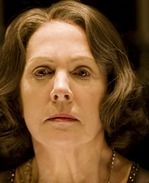SITE GUIDE
SEARCH
REVIEWS
REVIEW ARCHIVES
ADVERTISING AT CURTAINUP
FEATURES
NEWS
Etcetera and
Short Term Listings
LISTINGS
Broadway
Off-Broadway
NYC Restaurants
BOOKS and CDs
OTHER PLACES
Berkshires
London
California
New Jersey
DC
Philadelphia
Elsewhere
QUOTES
TKTS
PLAYWRIGHTS' ALBUMS
LETTERS TO EDITOR
FILM
LINKS
MISCELLANEOUS
Free Updates
Masthead
Writing for Us
A CurtainUp  London Review
London Review
 London Review
London ReviewThe Family Reunion
|
Everything is irrevocable; the past is irredeemable— Agatha
|

Penelope Wilton as Agatha
(Photo: Johan Persson) |
The Family Reunion's subject of sin, inner torment, pollution and expiation within a 1930s drawing room emphatically juxtaposes the commonplace and the profound. However to modern audiences, the everyday mundanity of the early twentieth century, such as dressing for dinner, is almost as alien as the Aeschylean influence. The metaphysical exploration of guilt and redemption is far removed from contemporary drama, let alone the choric ritualism of verses recited in unison or the moments of Delphic oracular yet cryptic revelation. Added to the often gnomic and abstract language, is the fact that Eliot insisted upon the now hideously unfashionable medium of verse. There are therefore certain barriers to the accessibility, alongside the sheer beauty, of Eliot's poetry.
Within these constraints Jeremy Herrin's direction wisely focuses on strong, clear performances in a sleekly dark production, sometimes favouring explication at the cost of visceral emotion. Sam West's Harry maintains his clipped 1930s accent throughout his haunted torment, but also manages to convey the warmth and sympathy of his tortured, if obscure, predicament. Gemma Jones puts in a doughtily formidable performance as Amy, the elderly matriarch only kept alive "by force of her personality". Penelope Wilton's Agatha adds an air of wise pragmatism to the stage, whilst Hattie Morahan gives a nuanced, lively and empathetic performance as Mary. Moreover, there is sterling support from the stately William Gaunt as the Honourable Charles Piper, the only chorus member whose blinkered vision begins to widen.
The design by Bunny Christie features tall mahogany panels and casement windows, which appropriately enough add an air of genteel sombreness to the family home. Concealed at the back of the murky stage are hidden entrances to allow sudden ghostly appearances onstage. In keeping with the eerie atmosphere are the Eumenides, here portrayed as small, ghoulish boys carrying large butterfly nets in a brilliantly inspired idea to create an era-specific version of the Greek mythic avengers.
This production bravely tackles a gargantuan task: a classically momentous play with unwieldy text, densely textured poetry and high-flown circumlocution. Embracing the formality and ritualism, especially of the chorus, Jeremy Herrin also finds room for innovation, not least with the Eumenides. There is a strongly-evoked sense of the past's lurking layers and the corruption of time's natural progress, as well as a chilling atmosphere of fate and lack of free will. Nevertheless, inside this tightly controlled milieu and within the precise, dated setting, expert performances hint at the timelessness of Eliot's themes.
|
The Family Reunion
Written by T.S. Eliot Directed by Jeremy Herrin Starring: Gemma Jones, Penelope Wilton, Samuel West, Hattie Morahan With: Una Stubbs, Anna Carteret, William Gaunt, Paul Shelley, Ann Marcuson, Kevin McMonagle, Christopher Benjamin, Phil Cole, Charlie Coopersmith, Ben Galvin, Elliot Horne, Thomas Huttlestone, Joss Littler, Harry Scott Designer: Bunny Christie Lighting Designer: Rick Fisher Composer and Sound Designer: Nick Powell Running time: Two hours 35 minutes with one interval Box Office: 0870 060 6624 Booking to 10 January 2009 Reviewed by Charlotte Loveridge based on 29th November 2008 evening performance at The Donmar Warehouse, 41 Earlham Street, Seven Dials, London WC2H 9LX (Tube: Covent Garden) |
|
REVIEW FEEDBACK Highlight one of the responses below and click "copy" or"CTRL+C"
Paste the highlighted text into the subject line (CTRL+ V): Feel free to add detailed comments in the body of the email and state if you'd like your comments published in our letters section. |
|
London Theatre Tickets Lion King Tickets Billy Elliot Tickets Mighty Boosh Tickets Mamma Mia Tickets We Will Rock You Tickets Theatre Tickets |




